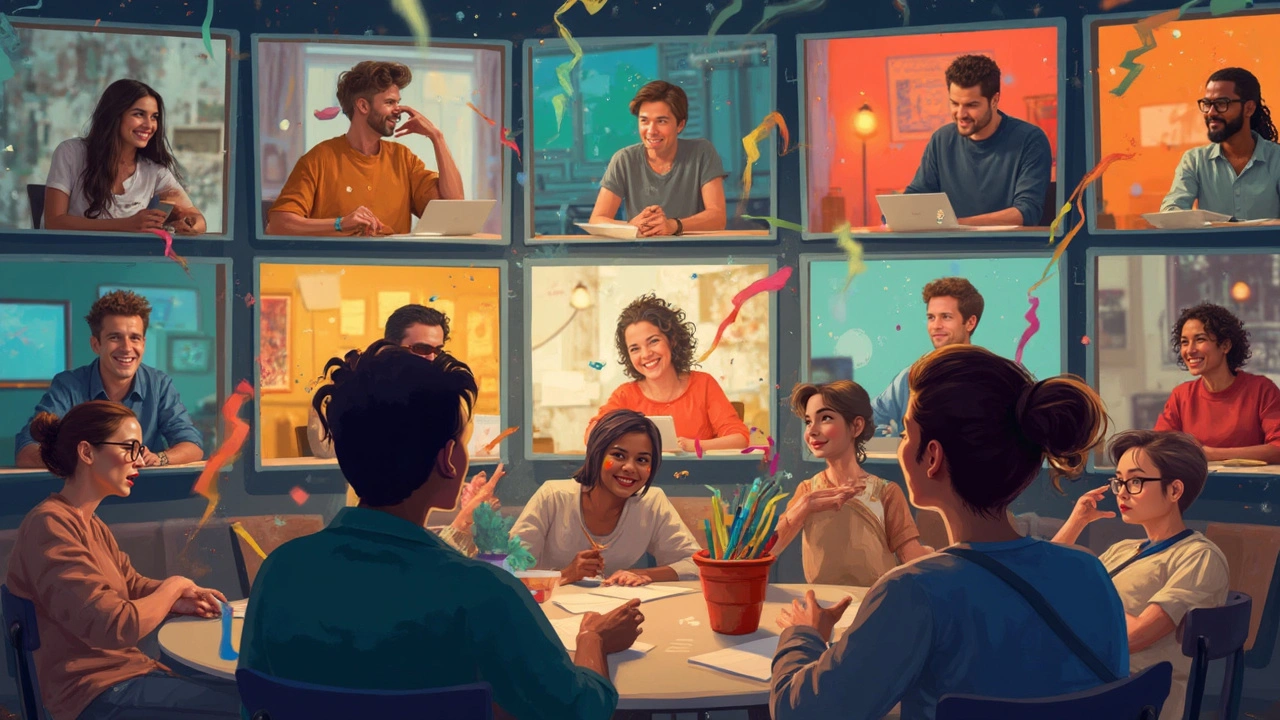Why Consider an MFA in Creative Writing?
Thinking about diving into the world of fiction, poetry, or playwriting? An MFA online might just be your passport. These days, more folks are turning to virtual classrooms to snag their Master of Fine Arts degrees, and for good reasons. First off, it’s flexibility galore. Imagine crafting your dream novel or a collection of poems in your pajamas, all while sipping a cup of your favorite brew.
And let's be honest, the world has changed, especially since the pandemic. The online classroom has become a standard part of education. You’re not sacrificing the quality of education, just altering the delivery mode. Think of it like swapping your paperbacks for a Kindle; the story’s the same, just a different format. Online programs make higher education accessible, especially for those who juggle multiple responsibilities like work or family.
Then there's the networking. It might not be the cocktail party vibe of a campus program, but the connections you make can be just as valuable. Many online courses integrate social platforms and group projects, allowing you to make friends and future colleagues from all over the globe.
Choosing the Right Program: What to Look For
With tons of programs sprouting like mushrooms, picking the right one can feel overwhelming. But don’t worry, I’ve got your back. Start with the basics: what's your focus? If your heart skips a beat for memoir writing or the stanzas of ethereal poetry, go for a program that offers specialized tracks. These not only refine your skills but also enhance your portfolio.
Another thing to eye on is the faculty. Are the professors published authors, experienced, and recognized in the realm of creative writing? A knowledgeable mentor can be the catalyst that turns your creative ideas into polished masterpieces. Also, sniff out reviews, catch up with alumni on forums, and see where the graduates have landed careers. It gives an authentic peek into the potential of that program.
However, don’t forget the practical stuff like the cost. Some programs, while handy with scholarships and financial aid, may still pinch your pocket. Draw a budget and see what suits your wallet without draining it.

Perks and Challenges of an Online MFA
MFA online programs come with their own set of pros and pitfalls. The big splash? The flexibility and creative freedom! Nights, weekends, or midday - the choice is yours to carve out those projects and turn them in. This is golden for multitaskers, parents, or even folks living in remote areas without easy access to a campus.
The flip side? It’s not a cakewalk. An online program demands self-discipline. Think of it like running a marathon without a crowd cheering; the motivation has to come from within. It’s easy to procrastinate, so staying organized and setting deadlines is crucial.
Technological challenges linger too. A stable internet connection and reliable hardware become your essentials. And while group projects and forums help in collaborating, some might miss the personal touch of face-to-face interaction. Nonetheless, staying proactive and engaged can minimize these hurdles.
Steps for Success in an Online MFA Program
Alright, ready to embark on this educational journey? Here are a few steps to ensure it’s smooth sailing. First, treat an online program with the same seriousness as a campus one. Set up a designated writing corner, free from distractions. Turn off those pesky notifications and carve out a study schedule. Even if it's only an hour each day, consistency will make a world of difference.
Engage with your peers. Participate in forums, join reading groups, and dare to give and receive constructive criticism. Collaboration can sometimes spark the most unexpected ideas and provide insights you wouldn't conjure up solo.
Don’t hesitate to reach out to professors. They may hold office hours or be available for virtual one-on-one chats. A question unasked is an answer lost. Lastly, balance is key. Take breaks, switch off screens when you need to, and keep those creative juices flowing by exploring different forms of storytelling or writing prompts. After all, this should be a rewarding journey, not a chore!


Comments
Vimal Kumar
This article really hits on some key points about the accessibility of online MFA programs. I love the flexibility aspect since it lets people from all over the world pursue their creative passions without uprooting their lives. The ability to balance work, family, and study is a game-changer for many folks.
Also, the practical tips section is super helpful because choosing the right program can be overwhelming with so many options available nowadays. It's important to consider curriculum, faculty, and community support, not just the price or brand. Anyone who’s thought about an online MFA knows it’s not just about convenience; the quality of the program matters a lot.
Have any of you experienced challenges with motivation or engagement in remote learning? I’m curious what strategies people have found useful to stay on track creatively.
Jen Deschambeault
Honestly, I’m a bit skeptical about the idea that an online MFA can match the traditional in-person experience. Creative writing is such a nuanced craft, and I feel like some of the magic comes from face-to-face interactions and spontaneous brainstorming sessions.
Yes, flexibility is great, but does that compensate for the lack of real-time feedback or the energy in a physical workshop? I think online programs might work for certain personalities but not all. Just a thought.
Still, it’s cool that more people get access to education, but let’s not pretend it’s a perfect substitute for on-campus intensity.
Kayla Ellsworth
Oh, come on. The whole MFA degree, whether online or offline, is just a fancy way to say you’re going to spend a bunch of money on workshops and critiques that may or may not actually improve your writing. Flexibility? Accessibility? Those are just buzzwords packaged to sound trendy.
At the end of the day, creativity either comes from within or it doesn't. Degrees don't unlock anything.
But hey, if you want a shiny certificate to hang on your wall and call yourself a writer, go for it.
Amit Umarani
I noticed the article didn't dive enough into the issues of accreditation and the varying quality among online MFAs, which is a crucial point. Some programs might sound amazing, but without legit accreditation, the degree means very little professionally.
Also, the grammar and curriculum rigor matters a lot. It’s not just about convenience, but the actual learning value. Anyone who’s serious about writing should do their homework on that front.
Otherwise, it's easy to end up with a diploma that can't open doors.
Does anyone have recommendations for reputable online MFA programs?
Soham Dhruv
I've been coaching a few clients who pursued online MFAs recently, and honestly, the flexibility really makes a difference when balancing family and creative goals. Of course, self-discipline is key because no one’s watching over your shoulder. The community aspect online can be hit or miss, but many programs have great forums and workshops that connect students well.
One tip I'd add is to make sure you actively engage in discussion groups—even just lurking isn’t enough. The more you put in, the more you’ll get out. And don’t hesitate to reach out to professors with questions; responsiveness varies by school but many are supportive online.
Fredda Freyer
Reflecting philosophically on the nature of creativity and education, I do believe that the medium of instruction—online versus traditional—shapes the experience but does not delimit the potential for growth. Creativity is, after all, a transcendental endeavor that can flourish in many environments.
The key is thoughtful pedagogy and an engaged student mindset. The article's focus on practical tips is vital; without a clear plan and self-motivation, any program might fail the aspirant.
I'm curious, from a pedagogical perspective, how online platforms are innovating to simulate the intimacy of in-person workshops?
Sumit SM
Ahhh—this intriguing pursuit of creative expression via digital corridors—opening portals to latent potentials, where the boundaries between teacher and pupil dissolve and become collaborative realms !!! Imagine the symbiosis, the torrent of ideas flowing unrestricted by geography—indeed, the novelty and challenge coalesce as enigmas begging exploration !!!
Yet, we must contemplate if this virtual canvas can indeed replicate the nuanced dance of critique and encouragement that blossoms within hallowed halls of tradition ???
This discussion sparks an eternal dialectic of art and technology, a moment most ripe for reflection !!!
Vimal Kumar
Building on what others have said, I think the success of an online MFA really depends on what you want out of it. If you’re after deep community and immersive experiences, it might feel limited without in-person contact. But if flexibility and managing other life priorities are your goals, this format opens doors that were previously sealed.
Vimal here again, and from personal experience, joining active online writing groups and scheduling regular video calls with peers can replicate a lot of the energy of in-person workshops. Plus, recorded lectures mean you can revisit lessons anytime, which helps cement learning.
What do you think about the idea of hybrid programs that combine both online and occasional physical meet-ups? Those might offer the best of both worlds.
Soham Dhruv
I really like the hybrid approach idea! It’s a great way to stay flexible while still getting that face-to-face connection. In fact, some of the people I know who thrive creatively take that route—online for lectures and independent writing, and periodic in-person retreats or residencies for workshops and networking.
It balances self-paced learning with vital social interaction that fuels creativity.
Would love to see more programs adopting that model moving forward.
Fredda Freyer
The hybrid model indeed captures the dialectic between technology and embodiment. As we embrace digital epochs, the reintroduction of corporeal presence amid virtual engagement reaffirms the symbiotic nature of human creativity. It gestures toward an integrative pedagogy embracing multiplicity, versatility, and depth.
Choosing such programs aligns with the contemporary learner’s emancipation from rigid molds while maintaining connection to tradition.
In this light, the journey of unlocking creative potential itself mirrors the hybridity of learning modalities—complex yet promising.